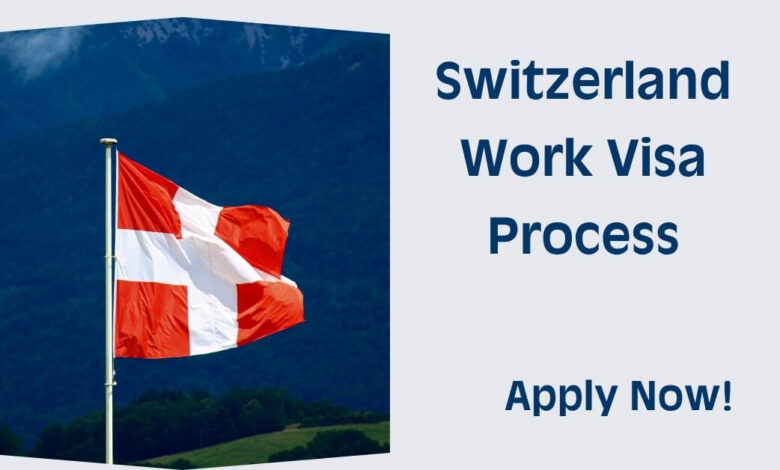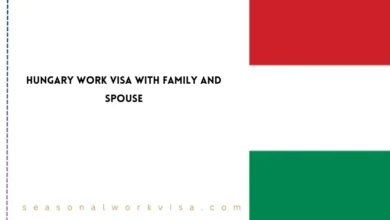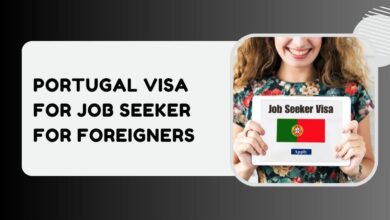Switzerland Work Visa Process 2026

Switzerland Work Visa Process, Switzerland is known for its high quality of life, excellent work opportunities, and breathtaking scenery. With its diverse economy, Switzerland attracts thousands of international professionals each year. However, working in Switzerland requires non-citizens to apply for a work visa and residence permit.
Salaries in Switzerland are highly competitive, ranging from CHF 60,000 to CHF 120,000 annually depending on experience and profession. This guide provides an in-depth explanation of the work visa process for people from EU/EFTA countries, the UK, and non-EU/EFTA nations, highlighting the specific steps and requirements for each category.
Check Also: Nestle Jobs in Switzerland with Visa Sponsorship
Why Do You Need a Work Visa for Switzerland?
Before you can begin working in Switzerland, it is essential to understand why a work visa is necessary. A work visa or permit serves as proof that the Swiss government has authorized you to work and live within the country. You must apply for different permits or visas based on your nationality and job type.
Types of Work Permits and Visas in Switzerland:
Switzerland has a structured and regulated immigration system. Below, we break down the key residence permits based on whether you are from the EU/EFTA, the UK, or a non-EU/EFTA country.
1. Work Visas for EU/EFTA Citizens:
Switzerland is part of the European Free Trade Association (EFTA), and for most EU/EFTA nationals, moving there is easier due to the Agreement on the Free Movement of Persons.
- Short-term Employment (Less than 3 months):
If you are an EU/EFTA citizen, you do not need a work visa or permit to work in Switzerland for less than three months. However, you may still need to register with the local authorities. - Long-term Employment (More than 3 months):
If you plan to work in Switzerland for more than three months, you must apply for a residence permit. The most common types for EU/EFTA nationals include- B Permit: This is a temporary residence permit for EU/EFTA nationals and is usually valid for five years.
- C Permit: The category is for those who have been living in Switzerland for a long time (usually five years) and wish to apply for permanent residency.
- L Permit: This is a short-term residence permit for EU/EFTA nationals working on contracts that last for less than a year.
- G Permit (Cross-border commuters): If you live in a neighboring country but work in Switzerland, you may be eligible for the G permit, which allows you to commute regularly.
2. Work Visas for UK Citizens (Post-Brexit):
Since the UK left the European Union, UK citizens no longer benefit from the free movement of workers. UK nationals now face the same requirements as non-EU/EFTA nationals when applying for work visas.
- Residence Permits for UK Nationals: UK citizens can apply for work permits under the same regulations as those from non-EU countries. The most common visa types include
- Permit L (Short-term resident permit): For contracts under one year.
- Permit B (Temporary residence permit): For long-term employment.
- Permit C (Permanent residence permit): Available after five years of continuous residence.
- Permit G (Cross-border commuter permit): For those living in neighboring countries but working in Switzerland.
3. Work Visas for Non-EU/EFTA Nationals:
Switzerland has a more complex process for non-EU/EFTA nationals, as the country prioritizes skilled labor and professionals for work permits. As a result, most work permits are issued for highly skilled workers, students, and recent graduates with work experience.
- Types of Permits for Non-EU Nationals:
- Permit B (Temporary work and residence permit): Generally issued for one year but can be extended if needed. The applicant must meet certain qualifications, including having a job offer from a Swiss employer.
- Permit L (Short-term work permit): For contracts lasting less than one year.
- Permit C (Permanent residence permit): Available after five years of continuous residence in Switzerland.
- Permit G (Cross-border commuter permit): For people living in a neighboring country but working in Switzerland.
- Permit N (Asylum Seekers): For individuals seeking asylum in Switzerland, usually given on a temporary basis.
- Permit S (Protection-seeking individuals): For individuals who need international protection and are granted temporary residence.
Eligibility Criteria for Switzerland Work Visas:
Regardless of whether you are from the EU, UK, or a non-EU/EFTA country, there are several essential requirements for being eligible for a work visa:
- Proof of Employment: To apply for a work visa in Switzerland, you must have an official job offer from a Swiss employer. The company will typically apply for your residence permit on your behalf.
- Skills and Qualifications: Switzerland has a high demand for skilled workers in sectors like healthcare, technology, finance, engineering, and academia. You will need to demonstrate that you possess the relevant skills, education, and experience required for the job.
- Language Skills: While most Swiss companies operate in multiple languages, knowing one of Switzerland’s official languages (German, French, or Italian) can be advantageous, especially for those seeking jobs in customer-facing roles or within local communities.
- Salary and Working Conditions: Your salary and working conditions must meet the standards set by Swiss labor laws, which are designed to ensure fair compensation and job security.
How can I apply for Switzerland Work Visa Process?
The process for applying for a work visa in Switzerland is straightforward but can vary based on the type of residence permit you are applying for. Here’s a general step-by-step guide to applying:
- Secure a Job Offer: Before applying for a work visa, you must have a confirmed job offer from a Swiss employer. Your employer will play a crucial role in the application process, as they will submit the necessary documentation to the Swiss authorities.
- Gather Required Documents: The specific documents required may vary depending on the type of work permit, but they generally include:
- A valid passport
- Proof of employment (job offer)
- Proof of qualifications (degrees, certificates)
- Curriculum Vitae (CV) outlining your experience
- Health insurance coverage
- Proof of financial means to support yourself
- Language proficiency (if required)
- Submit Your Application: Depending on your nationality, you will either submit your application directly at a Swiss consulate or embassy in your home country, or your employer may handle the submission in Switzerland.
- Wait for Processing: The processing time for a work visa can vary, but it typically takes between 1 and 3 months. You will need to wait for approval before proceeding to the next steps.
- Register Upon Arrival in Switzerland: Once you arrive in Switzerland, you must register at the local Residents’ Registry Office in your canton within 14 days. At this point, they will issue your residence permit.
Key Challenges and Tips for Success:
While the process for applying for a work visa is well-structured, there are several challenges that applicants might face. Here are some tips to improve your chances:
- Plan Ahead: Start the visa process well in advance of your intended move. Processing times can be lengthy, and waiting too long can delay your plans.
- Research Job Opportunities: Take time to search for job opportunities and learn about the requirements for your specific field. Popular job boards include jobs.ch, LinkedIn, and the Swiss government’s job portal.
- Ensure Your Skills Match Swiss Needs: Focus on in-demand professions such as healthcare professionals, IT specialists, engineers, and researchers to increase your chances of obtaining a work visa.
- Be Prepared for Additional Costs: While Switzerland offers a high quality of life, it is also expensive. Make sure to allocate funds for expenses such as health insurance, housing, and transportation, as your employer might not cover them.
Conclusion:
Switzerland offers fantastic opportunities for skilled professionals to live and work. Whether you are coming from an EU/EFTA country, the UK, or a non-EU/EFTA nation, understanding the various visa and residence permit options will help you navigate the immigration process successfully. By following the steps outlined in this guide, securing the proper work visa, and ensuring you meet the eligibility requirements, you can begin your new career in one of Europe’s most vibrant and stable economies.
Frequently Asked Questions:
Who needs a work permit to work in Switzerland?
You need a work permit to work in Switzerland if you are not from there. To get a work pass, EU/EFTA citizens, UK citizens, and people who are not EU/EFTA citizens must follow different rules and steps.
What types of residence permits are available in Switzerland?
Switzerland has different rules for people who are not EU/EFTA citizens and people who are EU/EFTA citizens. For EU/EFTA citizens, the categories are B, C, Ci, G, and L. For citizens of other countries, the categories are Ci, F, G, N, and S.
Could you please let me know the typical processing time for obtaining a work visa for Switzerland?
Processing time can range from 1 to 3 months depending on your nationality, type of visa, and the complexity of your application.




